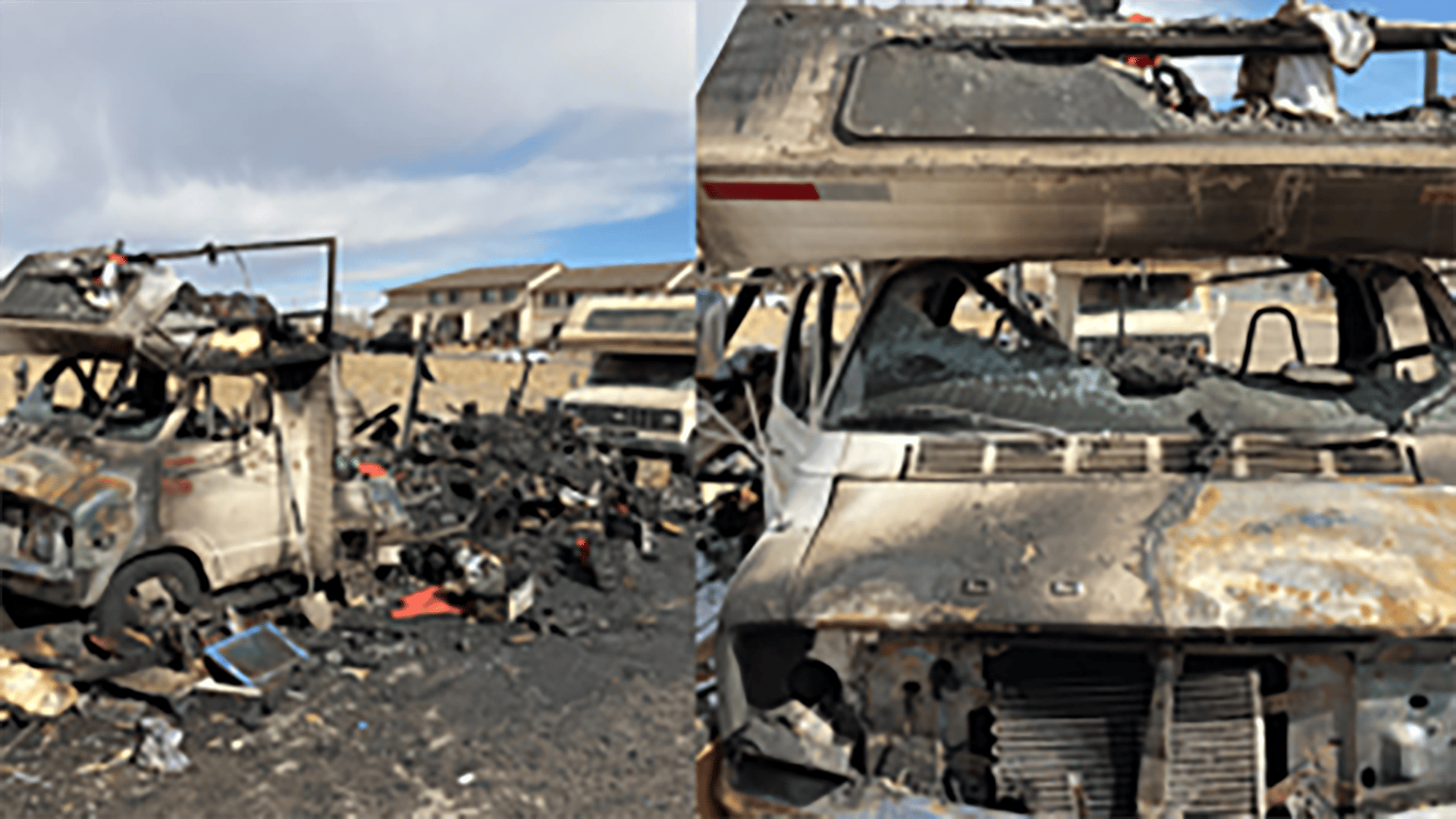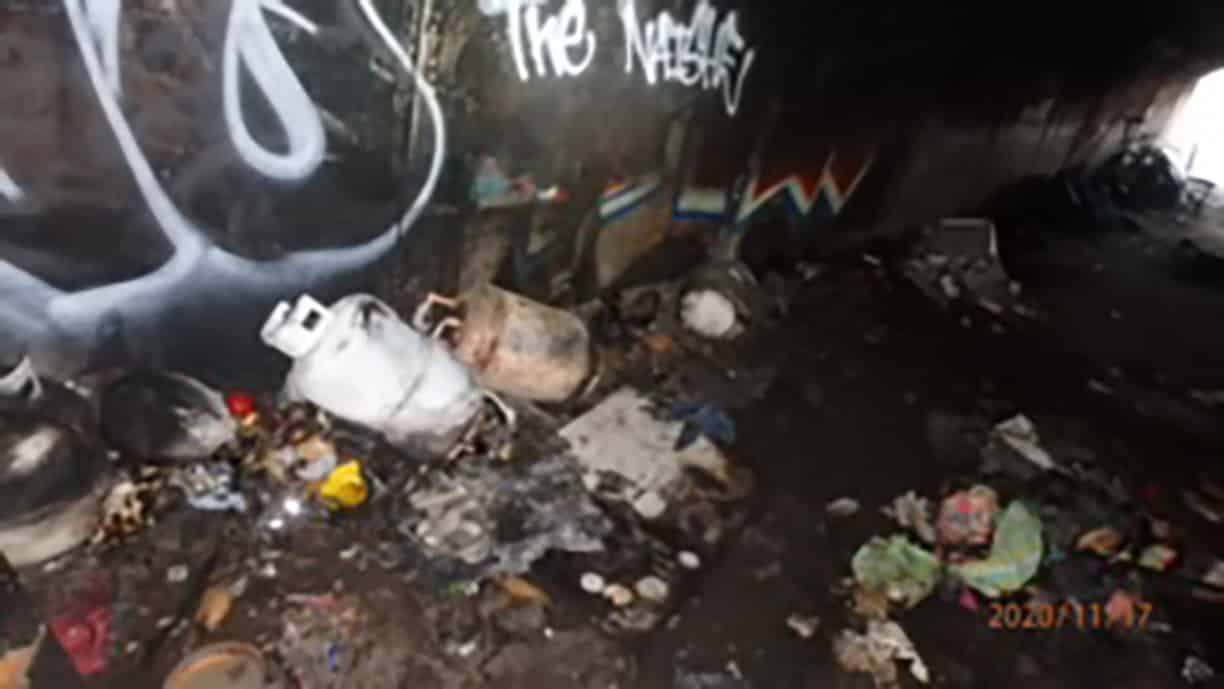
A burned out RV sits at a homeless encampment between Pecos Street and Arizona Avenue. The fire was caused by a generator left running inside. (Photos courtesy of Denver Fire Department)
Good intentions are instead making an unstable situation more combustible, according to the Denver Fire Department.
Denverites wanting to help the homeless often donate a propane tank like the ones used with a backyard gas grill.
Firefighters battle hundreds of fires a year at campsites and end up confiscating those donated tanks, said Assistant Chief Greg Pixley, DFD spokesman.
In the first six months of the year, DFD responded to 404 fires at homeless encampments. If that pace holds, it’ll be 808 by the end of 2022, a nearly 13 percent increase from 2021’s total of 716.
“These situations are quite dangerous. And we understand that people are doing their best to survive,” he said.
Historical context beyond that is slim. Pixley said DFD only began specifically tracking fires at homeless encampments midway through 2020, after realizing how prevalent they had become.
Pixley said that of the fires that need to be investigated to determine their cause — where the cause is not apparent at the scene — 40 percent wind up being homeless related.
Fires in homeless camps can be particularly dangerous for firefighters because the camps are often densely populated and house extremely flammable materials, notably propane tanks.
Last year, DFD disposed of 16,612 pounds of propane — equivalent to about 831 20-pound tanks. (The tanks most often used for a grill can hold 20 pounds).
In the first half of 2022, DFD collected over 8,000 pounds of propane, putting the department on a similar pace, Pixley said.
“When these types of 20-pound tanks explode, it could level a section of a home or a building,” he said.
The department also disposed of 495 gallons of gasoline seized from encampments last year, Pixley said. Some vagrants use generators that run on gasoline to power their campsites.

The remnants of a homeless camp along Sanderson Gulch under Federal Boulevard. A fire stained the concrete.
In one instance, DFD responded to a large fire at an encampment along Sanderson Gulch underneath Federal Boulevard at the western edge of Ruby Hill, Pixley said. Firefighters found seven tanks containing 161 pounds of propane. The smoke from the fire stained the bridge’s walls and caused minor fractures in the concrete. Luckily, no structural damage was noted.
RV camps bring new dangers
The issue becomes compounded when RVs are involved. The vehicles, more and more ubiquitous parked on city streets, can have multiple fuel sources, including propane. Once a flame gets going, things like cabinets or upholstery feed the blaze.
RV fires are becoming more common, Pixley said. Last year, the department responded to 32 of them. This year, that number is already well into the high 20s.
Pixley described a fire around the intersection of Arizona Avenue and Pecos Street in Ruby Hill that was started by a generator and threatened the lives of the occupants.
He said that at a homeless encampment near an Xcel substation, the department found four RVs and a van parked near the charred remnants of another one. That RV’s owner said she had to escape from the roof hatch in the vehicle.
DFD found multiple propane cylinders at the scene, totaling about 60 pounds. A 33-pound propane canister that had been severely damaged was also recovered about 50 feet from the scene, threatening the neighboring Xcel substation.
Pixley also shared a video that a citizen took of a blaze in a tractor trailer near his home back in April. The fire is believed to have been started by vagrants. Afterward, DFD collected 527 pounds of propane on the scene. In the video, you can hear the propane tanks exploding.
In some cases, the cause of these fires, especially in RVs, comes from people conducting illegal activities like cooking meth or marijuana to make hash, Pixley said.
Last year, DFD disposed of over 178 pounds of marijuana. This year, the department has already collected over 70 pounds of marijuana.
Despite these steep challenges, Pixley remains confident in DFD’s ability to continue providing accurate protection for the city.
“Every time that we respond, we don’t limit — but we put at issue — our capabilities to respond appropriately to the next emergency. And we adjust for that; we have the capability to have overlap and we’re not going to put any individual or organization or environment at risk,” he said. “But when we increase that many calls, that certainly serves to have an effect on what we as firefighters do.”
Pixley added that the solution is clear: the community needs to focus on getting people housed.
“We also need people to understand that donating LPG tanks to those that are living on the streets is not necessarily helping increase their capability to be able to get back to a situation where the streets are not necessary, where we can get them into sustainable housing where we can get them work so they don’t have to live in a way that that puts themselves and the public at risk,” he said.

A burned out RV sits at a homeless encampment between Pecos Street and Arizona Avenue. The fire was caused by a generator left running inside. (Photos courtesy of Denver Fire Department)
Good intentions are instead making an unstable situation more combustible, according to the Denver Fire Department.
Denverites wanting to help the homeless often donate a propane tank like the ones used with a backyard gas grill.
Firefighters battle hundreds of fires a year at campsites and end up confiscating those donated tanks, said Assistant Chief Greg Pixley, DFD spokesman.
In the first six months of the year, DFD responded to 404 fires at homeless encampments. If that pace holds, it’ll be 808 by the end of 2022, a nearly 13 percent increase from 2021’s total of 716.
“These situations are quite dangerous. And we understand that people are doing their best to survive,” he said.
Historical context beyond that is slim. Pixley said DFD only began specifically tracking fires at homeless encampments midway through 2020, after realizing how prevalent they had become.
Pixley said that of the fires that need to be investigated to determine their cause — where the cause is not apparent at the scene — 40 percent wind up being homeless related.
Fires in homeless camps can be particularly dangerous for firefighters because the camps are often densely populated and house extremely flammable materials, notably propane tanks.
Last year, DFD disposed of 16,612 pounds of propane — equivalent to about 831 20-pound tanks. (The tanks most often used for a grill can hold 20 pounds).
In the first half of 2022, DFD collected over 8,000 pounds of propane, putting the department on a similar pace, Pixley said.
“When these types of 20-pound tanks explode, it could level a section of a home or a building,” he said.
The department also disposed of 495 gallons of gasoline seized from encampments last year, Pixley said. Some vagrants use generators that run on gasoline to power their campsites.

The remnants of a homeless camp along Sanderson Gulch under Federal Boulevard. A fire stained the concrete.
In one instance, DFD responded to a large fire at an encampment along Sanderson Gulch underneath Federal Boulevard at the western edge of Ruby Hill, Pixley said. Firefighters found seven tanks containing 161 pounds of propane. The smoke from the fire stained the bridge’s walls and caused minor fractures in the concrete. Luckily, no structural damage was noted.
RV camps bring new dangers
The issue becomes compounded when RVs are involved. The vehicles, more and more ubiquitous parked on city streets, can have multiple fuel sources, including propane. Once a flame gets going, things like cabinets or upholstery feed the blaze.
RV fires are becoming more common, Pixley said. Last year, the department responded to 32 of them. This year, that number is already well into the high 20s.
Pixley described a fire around the intersection of Arizona Avenue and Pecos Street in Ruby Hill that was started by a generator and threatened the lives of the occupants.
He said that at a homeless encampment near an Xcel substation, the department found four RVs and a van parked near the charred remnants of another one. That RV’s owner said she had to escape from the roof hatch in the vehicle.
DFD found multiple propane cylinders at the scene, totaling about 60 pounds. A 33-pound propane canister that had been severely damaged was also recovered about 50 feet from the scene, threatening the neighboring Xcel substation.
Pixley also shared a video that a citizen took of a blaze in a tractor trailer near his home back in April. The fire is believed to have been started by vagrants. Afterward, DFD collected 527 pounds of propane on the scene. In the video, you can hear the propane tanks exploding.
In some cases, the cause of these fires, especially in RVs, comes from people conducting illegal activities like cooking meth or marijuana to make hash, Pixley said.
Last year, DFD disposed of over 178 pounds of marijuana. This year, the department has already collected over 70 pounds of marijuana.
Despite these steep challenges, Pixley remains confident in DFD’s ability to continue providing accurate protection for the city.
“Every time that we respond, we don’t limit — but we put at issue — our capabilities to respond appropriately to the next emergency. And we adjust for that; we have the capability to have overlap and we’re not going to put any individual or organization or environment at risk,” he said. “But when we increase that many calls, that certainly serves to have an effect on what we as firefighters do.”
Pixley added that the solution is clear: the community needs to focus on getting people housed.
“We also need people to understand that donating LPG tanks to those that are living on the streets is not necessarily helping increase their capability to be able to get back to a situation where the streets are not necessary, where we can get them into sustainable housing where we can get them work so they don’t have to live in a way that that puts themselves and the public at risk,” he said.
